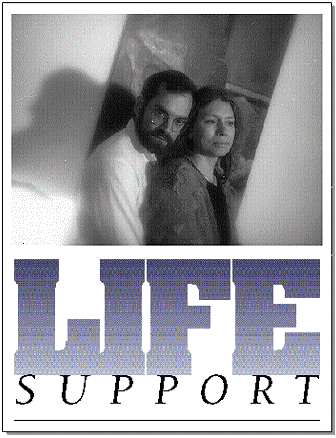
The University of Chicago Magazine
February 1997

The son of a general internist, John Lantos is a physician who's married to a fellow U of C pediatrician. Part of the task force that worked on the Clintons' ill-fated health-reform plan, Lantos also specializes in medical ethics. He's just written a book that asks a leading question: "Do we still need doctors?" His answer begins this way....
By John Lantos
Photos by Dan Dry
 odern doctors are armed with wonder drugs and wonder statistics--new analyses of cost-effectiveness, decision making, and genetic defects. Modern hospitals have a clean and sterile hum. Even in the intensive-care units, calm efficiency prevails. Patients are abstracted into lab values, digital readouts, radiographic images. Their individuality is lost.
odern doctors are armed with wonder drugs and wonder statistics--new analyses of cost-effectiveness, decision making, and genetic defects. Modern hospitals have a clean and sterile hum. Even in the intensive-care units, calm efficiency prevails. Patients are abstracted into lab values, digital readouts, radiographic images. Their individuality is lost. Perhaps that's as it should be. It's difficult to argue that it is more important to tell the stories of people with AIDS than to try to find a cure. But such an emphasis changes what we think and expect of doctors, and it changes how doctors think about themselves and their aspirations. It leads to a focus on measurable outcomes, on predictable interventions.
The problem is that much malaise does not fit into the model. In some cases, illnesses--arthritis; lower back pain; Huntington's, Hurler's, or Alzheimer's disease--are poorly understood and their treatments largely ineffective. In other cases, people simply don't behave the way the models would have them behave.
And there's a paradox: No matter how much medical progress we make, the net amount of disease and suffering doesn't decrease. There is no closure, no logical conclusion to the enterprise. Instead,
Continue reading "LIFE SUPPORT"
John D. Lantos is associate professor of pediatrics at the University of Chicago, where he is also associate director of the MacLean Center for Clinical Medical Ethics. A graduate of Brown University and the University of Pittsburgh School of Medicine, Lantos is the author of Do We Still Need Doctors?, to be published by Routledge in April.
Go to:
- INVESTIGATIONS
- CHICAGO JOURNAL
- EVENTS
- LETTERS
- CHICAGOPHILE
- Feature story, "LIFE SUPPORT"
- Feature story, "Brushes with perfection"
- Feature story, "Opening Chapters"
- Feature story, "Astronomical Figures"
- CLASS NEWS
- DEATHS
- BOOKS BY ALUMNI
- IN THE CLUBS
Return to February 1997 Table of Contents